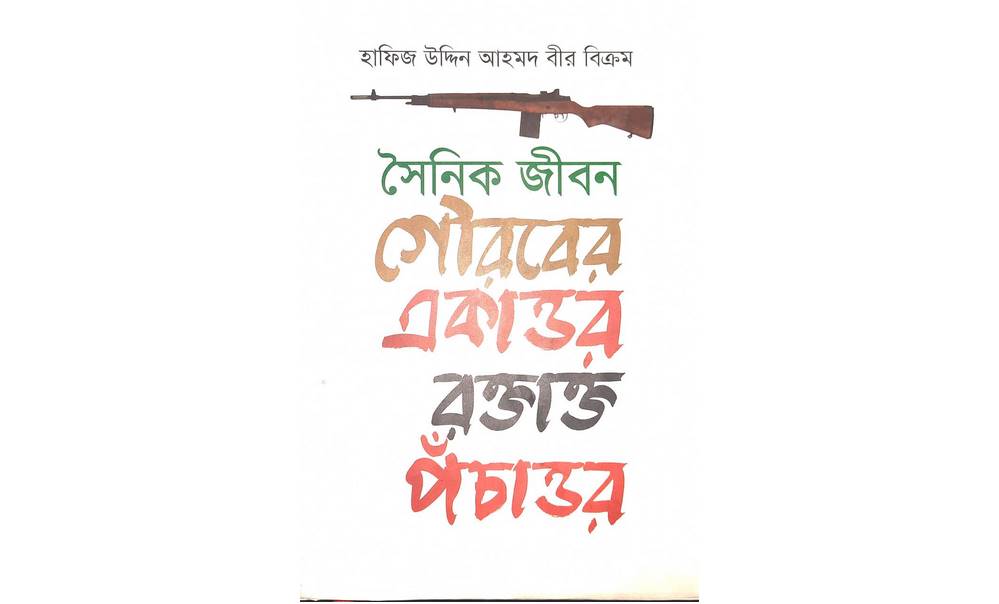| Title | সৈনিক জীবন : গৌরবের একাত্তর রক্তাক্ত পঁচাত্তর |
| Author | মেজর (অব.) হাফিজ উদ্দিন আহমেদ বীর বিক্রম |
| Publisher | প্রথমা প্রকাশন |
| ISBN | 9789849436539 |
| Edition | 1st Published, 2020 |
| Number of Pages | 271 |
| Country | বাংলাদেশ |
| Language | বাংলা |
sainik-jibon-gowraber-ekattor-roktakto-pochattor-pdf-hafiz-uddin-ahmed review:
October 26, 1956. Army chief Ayub Khan has seized power in Pakistan by ousting President Iskander Mirza. Pakistan is going to experience the first military rule in politics in the Indian subcontinent. Hafiz Uddin Ahmed was then in class nine. A carefree life. But with a strange turmoil around the military regime. The excitement touched Hafiz Uddin, leaving a lasting impression on his feelings. That is why Major (Retd) Hafiz Uddin Ahmed, who came to his last age, wrote ‘Sainik Jiban’ with the memory of Sainik Jiban; He started his book ‘Gaurab Ekattar, Raktakta Panchattar’ from the time of that change in 1956.
Major (Retd.) Hafiz Uddin Ahmed, once an accomplished footballer of the Pakistan national team, a shrewd officer in the army, an influential politician and a parliamentarian. He was a great fighter of the liberation war of 1971, Bir Bikram. In his own words, he is not well known as a writer. However, it witnessed many important events from 1956 to 1965. In particular, he had the opportunity to take part in the war of liberation in 1971, the organization of the post-war Bangladesh Army and the events of the seventy-fifth. Posara ‘soldier’s life’ of those memories and experiences. The author started the book at the request of Matiur Rahman, editor of the daily Prothom Alo. It has been published since the first publication.
The author is a resident of Barisal region. At the beginning of the book, therefore, the memory of the author’s childhood in Barisal came up. Then the story of entering Kakul Military Academy in Abbottabad through Dhaka University. In parallel with which the thrilling experience of the writer’s playing life continues, the dramatic commentary of contemporary political thrillers continues. The book depicts the path of how Kakul Military Academy turned a self-absorbed Bengali youth into a self-confident warrior who grew up in a very family environment.
During his stay in Kakul, the author first met Ziaur Rahman, a well-known character in the history of Bangladesh. According to the author,
“The referee wearing white shorts, sports shirt, power ‘sunglasses’ blew the whistle and called me in the middle to toss. He shook hands and said, I’m Major Zia.
Yes sir, I played in the university team. ‘
I swallowed and replied.
IM from Fast East Bengal, the football team of my battalion is the champion of the army. Mind brick. Major Zia laughed.
I said right sir. ”
In the book, he recounts his experience of playing for the Pakistan national team. Explains how the obsession of nationalist consciousness then ignited the playing field.
“The next day I went to Dhaka with the national team to the stadium. The anti-Ayub movement has already gained momentum. The mass movement of ’79 is getting more and more violent. In the end, all four of us played in the match in Dhaka. The Russian team won 3-1, I was the one to score for Pakistan.
After completing his training, the writer moved to Jessore with a posting in the First East Bengal Regiment. Meanwhile, the storm of mass uprising has started in books all over the country. Ayub is forced to resign, General Yahya takes power. Martial law was issued again. At this time the writer also has to perform martial law duty in Kushtia region. Going to do judicial work, he encountered all sorts of strange experiences.
After that, after 60 cyclones and various aspects of the election revolution, the course of events of the memoirs entered the liberation struggle period of 1971.
March 1971. The turbulent Bangladesh is slowly moving towards the final outcome, the path to independence On the night of 25th March, the Pak army attacked the unarmed Bengali nation. The fire of rebellion ignited all around. Captain Hafiz was then at the border. They were not informed about the situation in the country. When they returned to Jessore Cantonment on March 29, they found out that the country was on fire. In the meantime the first East Bengal was ordered to be disarmed. According to the author, that moment,
“On 29th March, I received instructions through radio to return to Jessore cantonment… ..30 March ’71. It was half past seven in the morning. ব্যা Taking away a soldier’s weapon is an extreme insult. Second Lt. Anna was in my room. As soon as he was informed of this news, he became excited and said, “Sir, I will not serve in the Pakistan Army. I will go to the office and take off my belt in front of the CO and resign. “Anwar’s belt was later stained with blood.
Eventually the first East Bengal inhabited by Bengalis revolted. The author took the lead in more than two hundred rebel troops in an electrical decision. The war began. The Pakistanis were already prepared for such an uprising. As a result, despite strong resistance, the Bengali warriors were forced to retreat gradually. They once crossed the cantonment and took refuge in a nearby village. According to the author, that moment, “Anwar and I, firing in separate groups through the dry field, proceeded towards the nearby village of Khitibadia … When we reached the village, we saw an incredible sight. Hundreds of villagers carrying spades, pickaxes, axes, spears, etc. Congratulations and hugs. ” Anwar was martyred while advancing through the field. The belt that Anwar wanted to take off and revolt was Major H.

